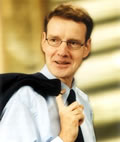Alexander Reinefeld

Alexander Reinefeld is the head of the Computer Science department of
the Zuse Institute Berlin and a professor for parallel and distributed
systems at the Humboldt-Universität zu Berlin. He received a Faculty
Award on grid computing in 2002, a Sir Izaak Walton Killam Memorial
Post-Doctoral Fellowship in 1987, and a PhD scholarship by the German
Academic Exchange Service in 1984. In 1987 and 1984 he spent two years
abroad at the University of Alberta in Edmonton, Canada, and before he
worked as an assistant professor and free-lance software consultant in
Hamburg. His research interests include grid and peer-to-peer
computing, distributed data management and high-performance computer
architecture.
Alexander Reinefeld is Giving the Following Talks
Building a transactional distributed data store with Erlang
The e-commerce platforms at Amazon, E-Bay or Google serve millions of
customers using tens of thousands of servers located in data centers
throughout the world. At this scale, components fail continuously and
it is difficult to maintain a consistent state while hiding failures
from the application.
Peer-to-peer protocols have been invented to provide availability by
replicating services among peers. The current systems are perfectly
tuned for sharing read-only data. To extend them beyond the typical
file sharing, the support of transactions on distributed hash tables
(DHTs) is a most important but yet missing feature.
At this talk given at the Erlang eXchange 2008, Alexander presented a key/value store based on DHTs that supports consistent writes. Alexander will explain how a system by Zuse Institute Berlin and onScale solutions GmbH comprises of three layers, all of them implemented in Erlang:
This is a joint development by Zuse Institute Berlin and onScale solutions GmbH.
At this talk given at the Erlang eXchange 2008, Alexander presented a key/value store based on DHTs that supports consistent writes. Alexander will explain how a system by Zuse Institute Berlin and onScale solutions GmbH comprises of three layers, all of them implemented in Erlang:
- a DHT layer for scalable, reliable access to replicated distributed data,
- a transaction layer to ensure data consistency in the face of concurrent write operations,
- an application layer with a very demanding access rate of several thousand reads/writes per second.
This is a joint development by Zuse Institute Berlin and onScale solutions GmbH.


